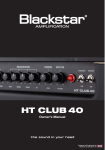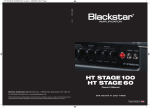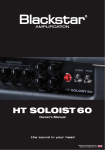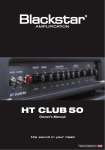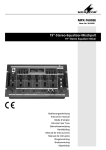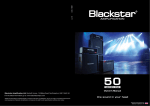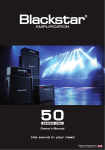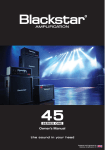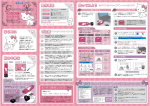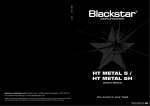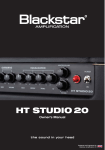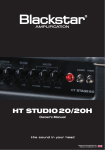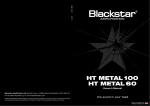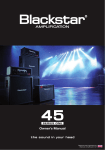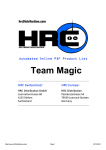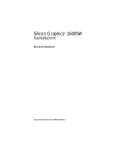Download ht soloist 60 handbook 18-11-09:Layout 1.qxd
Transcript
HT SOLOIST 60 Owner’s Manual Designed and Engineered by Blackstar Amplification UK IMPORTANT SAFETY INSTRUCTIONS 1. Read these instructions. USA / Canada 2. Keep these instructions 3. Heed all warnings. 4. Follow all instructions. 5. Do not use this apparatus near water. 6. Clean only with dry cloth. 7. Do not block any ventilation openings. Install in accordance with the manufacturer's instructions. 8. Do not install near any heat sources such as radiators, heat registers, stoves, or other apparatus (including amplifiers) that produce heat. 9. Do not defeat the safety purpose of the polarized or grounding-type plug. A polarized plug has two blades with one wider than the other. A grounding type plug has two blades and a third grounding prong. The wide blade or the third prong are provided for your safety. If the provided plug does not fit into your outlet, consult an electrician for replacement of the obsolete outlet. 10. Protect the power cord from being walked on or pinched particularly at plugs, convenience receptacles, and the point where they exit from the apparatus. 11. Only use attachments/accessories specified by the manufacturer. 12. Unplug this apparatus during lightning storms or when unused for long periods of time. 13. Refer all servicing to qualified service personnel. Servicing is required when the apparatus has been damaged in any way, such as power-supply cord or plug is damaged, liquid has been spilled or objects have fallen into the apparatus, the apparatus has been exposed to rain or moisture, does not operate normally, or has been dropped. “TO COMPLETELY DISCONNECT THIS APPARATUS FROM THE AC MAINS, DISCONNECT THE POWER SUPPLY CORD PLUG FROM THE AC RECEPTACLE”. “WARNING: TO REDUCE THE RISK OF FIRE OR ELECTRIC SHOCK, DO NOT EXPOSE THIS APPARATUS TO RAIN OR MOISTURE AND OBJECTS FILLED WITH LIQUIDS, SUCH AS VASES, SHOULD NOT BE PLACED ON THIS APPARATUS”. This symbol is intended to alert the user to the presence of important operation and maintenance (servicing) instructions in the literature accompanying the appliance. This symbol is intended to alert the user to the presence of uninsulated “dangerous voltage” within the product's enclosure that may be of sufficient magnitude to constitute a risk of electric shock to persons. 3 Warning! If the product does not operate normally, when the operating instructions are followed, then refer the product to a qualified service engineer. English READ THE FOLLOWING INFORMATION INSTRUCTIONS FOR FUTURE REFERENCE! CAREFULLY. SAVE English Important safety information! ALL The U.S. Government´s Occupational Safety and Health Administration (OSHA) has specified the following permissible noise level exposures: Follow all warnings and instructions marked on the product! Duration Per Day In Hours Sound Level dBA, Slow Response Danger! High internal operating voltages 8 90 Do not open the equipment case. There are no user serviceable parts in this equipment. Refer all servicing to qualified service personnel. 6 92 4 95 3 97 2 100 Condensation can form on the inside of an amplifier if it is moved from a cold environment to a warmer location. Before switching the unit on, it is recommended that that the unit me allowed to reach room temperature. 1½ 102 1 105 ½ 110 Unauthorised modification of this equipment is expressly forbidden by Blackstar Amplification Ltd. ¼ or less 115 Clean only with a dry cloth. Never push objects of any kind into ventilation slots on the equipment casing. Do not expose this apparatus to rain, liquids or moisture of any type. Follow all warnings and instructions marked on the product! Do not place this product on an unstable trolley, stand or table. The product may fall, causing serious damage to the product or to persons! Do not cover or block ventilation slots or openings. According to OSHA, any exposure in excess of the above permissible limits could result in some hearing loss. Ear plug protectors in the ear canals or over the ears must be worn when operating this amplification system in order to prevent a permanent hearing loss if exposure is in excess of the limits as set forth above. To ensure against potentially dangerous exposure to high sound pressure levels, it is recommended that all persons exposed to equipment capable of producing high sound pressure levels such as this amplification system be protected by hearing protectors while this unit is in operation. This product should not be placed near a source of heat such as a stove, radiator, or another heat producing amplifier. Use only the supplied power cord which is compatible with the mains voltage supply in your area. Power supply cords should always be handled carefully and should be replaced if damaged in any way. Never break off the earth (ground) pin on the power supply cord. The power supply cord should be unplugged when the unit is to be unused for long periods of time. Before the unit is switched on, the loudspeaker should be connected as described in the handbook using the lead recommended by the manufacturer. Always replace damaged fuses with the correct rating and type. Never disconnect the protective mains earth connection. High loudspeaker levels can cause permanent hearing damage. You should therefore avoid the direct vicinity of loudspeakers operating at high levels. Wear hearing protection if continuously exposed to high levels. 4 All electrical and electronic products should be disposed of separately from the municipal waste stream via designated collection facilities appointed by the government or the local authorities. 5 English Features Thank you for purchasing this Blackstar HT Soloist 60 amplifier. Like all our products, this amp is the result of countless hours of painstaking Research and Development by our world-class design team. Based in Northampton (UK), the Blackstar team are all experienced musicians themselves and the sole aim of the development process is to provide guitarists with products which are the ultimate tools for self expression. The HT Soloist 60 is a highly versatile amplifier suited to a wide range of playing styles and situations. This compact and fully featured model has two channels, but the addition of the Solo Boost and Body functions effectively make this a three channel amplifier. All Blackstar products are subjected to extensive laboratory and road testing to ensure that they are truly uncompromising in terms of reliability, quality and above all TONE. The HT Soloist 60’s highly flexible two channel design features the unique ISF (Infinite Shape Feature) control and although it has a comprehensive control set, it is still simple and intuitive to use. Please read through this handbook carefully to ensure you get the maximum benefit from your new Blackstar product. If you like what you hear and want to find out more about the Blackstar range of products please visit our website at www.blackstaramps.com. Thanks! The Blackstar Team English Introduction The Clean Channel has two modes, ‘boutique’ and ‘modern’ and its own Tone control providing a wide range of clean tones. The Voice switch reconfigures both the preamplifier voicing and gain structure, and also the power amplifier damping to reproduce either ringing Class A performance in the ‘boutique’ mode, or very clean and tight Class AB tones in the ‘modern’ setting. The Overdrive channel has its own EQ section and like the Clean channel a Voice switch which allows the character of the channel to be changed, providing a variety of overdriven tones. This channel is characterised by a tone which is high in gain, but lacks any of the detached top-end ‘fizz’ often found in similar designs. This is a result of unique preamplifier and power amplifier shaping techniques, which also benefit the player in the way the overdrive cleans up beautifully as the guitar volume is reduced. Even at the most extreme settings, the overdrive channel remains natural sounding. The Patent-Applied-For ISF (Infinite Shape Feature) control is unique to Blackstar Amplification and represents a major step forward in tone shaping flexibility. The ISF control shifts the response of the three control tone stack between a US type response at one end, and at the other a UK type response. Importantly, in between the two extremes, lie an infinite number of alternative tone choices that would be otherwise unavailable. The HT Soloist 60 also features a completely natural sounding digital reverb, which is outstandingly musical on both clean and crunch tones and raises the benchmark for guitar amplifier specific reverb design. A Dark/Bright switch allows the overall reverb characteristics to be modified to suit different tastes and playing styles. 6 7 English 10. Bass 1. Input Plug your guitar in here. Always use a good quality screened guitar lead. The Bass control adjusts the amount of low-end frequencies in your tone. This amp has an advanced tone shaping circuit which allows the tone to be varied from tight and cutting when counter clockwise, to warm and thumping when fully clockwise. 2. Clean Volume 11. Middle This controls the volume of the Clean Channel. Turning it clockwise increases the volume. The Middle control adjusts the amount of middle frequencies in your tone. The middle frequencies are particularly important in setting the amount of ‘body’ your tone has. With the Middle control set to its minimum position (fully counter clockwise) the sound will be aggressive and scooped, a tone ideal for aggressive rhythm playing. As the Middle control is increased (clockwise) the amount of ‘body’ is increased, which is more suitable for sustained lead guitar tones. 3. Voice In the out position the Clean Channel has a ‘boutique’ voicing, more focussed to middle and top end, with the power amplifier damping configured like many traditional Class A type amplifiers. This mode can produce pleasing levels of crunchy overdrive at higher settings of the Clean Volume control. With the switch in the in position the Clean Channel has a more ‘modern’ voicing, with a greater bass response and tighter sound from increased Class AB style power amplifier damping. The gain structure is also altered to keep the sound clean at higher settings of the Clean Volume control. 12. Treble The Treble control allows exact adjustment of the treble frequencies within the sound. At low settings (counter clockwise) the sound will be warm and darker in character. As the Treble control is increased (clockwise) the sound will become brighter. At the maximum settings the sound will be aggressive and cutting. 4. Tone 13. ISF (Infinite Shape Feature) The Tone control allows adjustment of the balance between treble and bass frequencies within the sound. At low settings (counter clockwise) the sound will be warmer and darker in character. As the Tone control is rotated clockwise the sound will become brighter. The ISF control works in conjunction with the Bass, Middle and Treble controls. It allows you to choose the exact tonal signature you prefer. Fully counter clockwise has a more American characteristic with a tight bottom-end and more aggressive middle, and fully clockwise has a British characteristic which is more ‘woody’ and less aggressive. 5. Overdrive Indicator When the RED LED is on the Overdrive Channel is selected. When the LED is off the Clean Channel is in operation. 6. Overdrive Select English Front Panel USA UK Unlike conventional ‘contour’ controls and parametric equalisation systems, the Bass, Middle and Treble controls remain interactive with each other just like in a traditional guitar amplifier tone stack. This leads to a very familiar, musical response. Press this switch to select the Overdrive Channel. 14. Reverb 7. Overdrive Gain The Gain control adjusts the amount of overdrive or distortion on the Overdrive Channel. Low settings (counter clockwise) will deliver a clean sound on the edge of break-up. As the Gain control is increased clockwise the sound will become more overdriven, moving through crunch tones until, at its maximum position, a full distorted tone is arrived at. 8. Voice With the Voice switch in the out position, the Overdrive Channel has a ‘classic’ overdrive voicing, tight and crunchy. When the switch is in, more mid-band gain is applied to give the overdrive sound more ‘body’ and a smoother overdrive characteristic, while power amp feedback is reduced to give a livelier, looser response. 8 The Reverb control sets the overall level of the reverb effect. With the control fully counter clockwise there will be no reverb. Turning the control clockwise will increase the amount of reverb. 15. Presence The Presence control sets the overall treble response of the amplifier. Percussive high-end can be accentuated on clean sounds and the amount of aggressive treble controlled with crunch and overdrive settings. 16. Body When the switch is in a mid frequency boost will be applied to the Overdrive Channel when Solo Boost is selected, adding more sustain without over emphasising the bass frequencies. 9. Overdrive Volume 17. Solo Boost This control adjusts the volume of the Overdrive Channel. Turning it clockwise increases the volume. This control sets the amount of increase in volume when the footswitchable Solo Boost is selected. 9 English speaker cabinet (or the internal loudspeaker of the HT Soloist 60 combo). This controls the overall volume of your amplifier. Turning it clockwise increases the volume. The outputs marked ‘1x8 Ohm or 2x16 Ohm’ are for the connection of either a single 8 Ohm extension cabinet or two 16 Ohm cabinets. Also, the internal loudspeaker of the HT Soloist 60 combo can be plugged in here if it is used with a 16 Ohm extension cabinet. See table below. 19. Power Indicator Light English 18. Master Volume The power indicator will light when the amplifier is switched on. ‘1x16 Ohm’ output ‘1x8 Ohm or 2x16 Ohm’ outputs 20. Standby Internal 16 Ohm combo speaker X X This switch enables the output stage. Always turn this switch on at least 30 seconds after the Power switch (21). During short breaks in playing use just this switch to turn ‘off’ and ‘on’ the amplifier’s output. Internal 16 Ohm combo speaker plus one 16 ohm extension cab X One 16 Ohm extension cabinet X X Two 16 Ohm extension cabinets X Single 8 Ohm extension cabinet X X 21. Power Switch This switch is used to turn the amplifier on and off. You should always turn this switch on before turning on the Standby switch (20). Rear Panel WARNING: The output marked ‘1x16 Ohm’ should never be used at the same time as any of the outputs marked ‘1x8 Ohm or 2x16 Ohm’ or ‘1x4 Ohm or 2x8 Ohm’ outputs. Failure to correctly match the impedance of the amplifier and speakers, will damage the amplifier. 1. Mains Fuse 7. Reverb Dark/Light The value of the Mains Fuse is specified on the rear panel. Never use a fuse of the incorrect value or attempt to bypass it. In the out position the digital reverb is voiced to have a warm dark quality. When the Light position is selected the reverb has a brighter quality with more zing on the reverb tail. 2. Mains Input The supplied detachable mains lead is connected here. The lead should only be connected to a power outlet that is compatible with the voltage, power and frequency requirements stated on the rear panel. If in doubt get advice from a qualified technician. 3. H.T. Fuse The value of the H.T. Fuse is specified on the rear panel. Never use a fuse of the incorrect value or attempt to bypass it. 4. Speaker Emulated Output This output emulates the tonal characteristics of a guitar speaker cabinet and provides a natural valve overdrive tone for connection to a recording device or mixing desk. Always use a good quality screened lead. NOTE: To ‘silently’ record, set the master volume to zero or turn the amp to standby mode. You may also record from this output while in standby mode without a loudspeaker connected, but ensure that no loudspeaker leads are connected to any of the loudspeaker output jack sockets of the amplifier, as this will defeat the load protection circuit and will cause damage to the amplifier. 8. Effects Loop Return Connect the (mono) output of an external effects unit here. 9. Effects Loop Send Connect the (mono) input of an external effects unit here. 10. Effects Loop Level The Effects Loop Level switch sets the effects loop to either +4dBV/-10dBV, which enables you to use it with either professional equipment (+4dBV setting), or with guitar level effects such as effects pedals (-10dBV setting). 11. Footswitch The supplied 4-way footswitch is connected here. The footswitch enables you to switch between the Clean and Overdrive channels, select the Solo Boost and switch the Reverb on or off. Technical Specification: 5. Cabinet Switch Power (RMS): 60 Watts The switch enables you to select either a 4x12 closed back or a 1x12 open back cabinet emulation for the Speaker Emulated Output. Valves: 2 x ECC83, 2 x EL34 Weight (kg): 24.4 6. Speaker Outputs The output marked ‘1x16 Ohm’ is for the connection of a single 16 Ohm extension 10 Dimensions (mm): 619 x 566 x 297 Footswitch: FS-6 supplied 11 Wichtige Informationen zur Sicherheit! LESEN SIE DIE FOLGENDEN INFORMATIONEN SORGFÄLTIG DURCH. BEWAHREN SIE ALLE ANLEITUNGEN FÜR DIE ZUKÜNFTIGE BEZUGNAHME AUF Befolgen Sie alle auf dem Produkt ausgewiesenen Warnungen und Anleitungen! Hohe Lautsprecherpegel können permanente Hörschäden verursachen. Sie sollten daher die direkte Nähe zu Lautsprechern, die auf hohen Pegeln betrieben werden, vermeiden. Tragen Sie einen Hörschutz, wenn Sie kontinuierlich hohen Pegeln ausgesetzt sind. Wenn das Produkt nicht normal funktioniert, während die Betriebsanleitung befolgt wird, übergeben Sie das Produkt an einen qualifizierten Servicetechniker. Öffnen Sie nicht das Gehäuse des Geräts. Es befinden sich keine vom Anwender zu wartende Teile in diesem Gerät. Überlassen Sie alle Servicearbeiten qualifiziertem Wartungspersonal. Nur mit einem trockenen Lappen reinigen Auf der Innenseite eines Verstärkers kann sich Kondensationsnässe bilden, wenn er von einer kalten Umgebung an einen wärmeren Ort bewegt wird. Es wird empfohlen, dass das Gerät vor dem Einschalten Zimmertemperatur erreicht. Unerlaubte Änderungen an diesem Gerät sind ausdrücklich von Blackstar Amplification Ltd verboten. Stecken Sie niemals Objekte jeglicher Art in die Lüftungsschlitze des Gehäuses. Setzen Sie dieses Gerät nicht Regen, Flüssigkeiten oder Feuchtigkeit jeglicher Art aus. Befolgen Sie alle auf dem Produkt ausgewiesenen Warnungen und Anleitungen! Platzieren Sie dieses Produkt nicht auf einem instabilen Rollwagen, Ständer oder Tisch. Das Produkt kann herunterfallen und dem Produkt oder Personen ernsthaften Schaden zufügen! Blockieren oder verdecken Sie nicht die Lüftungsschlitze oder -öffnungen. Dieses Produkt sollte nicht in der Nähe einer Wärmequelle wie einem Ofen, Heizkörper oder einem anderen Hitze entwickelnden Verstärker platziert werden. Die Verwaltung zur Gesundheit und Sicherheit am Arbeitsplatz der US-Regierung (OSHA) hat die folgenden zulässigen Lärmpegelbelastungen festgelegt: Dauer pro Tag in Stunden Lärmpegel dBA, Langsame Reaktion 8 90 6 92 4 95 3 97 2 100 1½ 102 1 105 ½ 110 ¼ oder weniger 115 Deutsch Deutsch Gefahr! Hohe interne Betriebsspannungen Laut der OSHA kann jede Belastung oberhalb der oben genannten zulässigen Grenzwerte zu gewissen Hörverlusten führen. Wenn dieses Verstärkersystem betrieben wird, müssen Ohrschützer im Ohrkanal oder über den Ohren getragen werden, um permanenten Hörverlust zu vermeiden, wenn die Belastung oberhalb der oben festgelegten Grenzwerte liegt. Um sich gegen potenziell gefährliche Belastungen durch hohe Schalldruckpegel zu schützen, wird empfohlen, dass alle Personen, die Geräten wie diesem Verstärkersystem ausgesetzt sind, die in der Lage sind, hohe Schalldruckpegel zu entwickeln, während des Betriebs dieses Geräts durch Ohrschützer geschützt werden. Verwenden Sie nur das zum Lieferumfang gehörende Netzkabel, das mit der Netzstromversorgung in Ihrer Region kompatibel ist. Netzkabel müssen stets mit Vorsicht gehandhabt und ersetzt werden, wenn sie in irgendeiner Weise beschädigt werden. Brechen Sie niemals den Erdungsstift (Erde) am Netzkabel ab. Das Netzkabel sollte aus der Steckdose gezogen werden, wenn das Gerät längere Zeit nicht verwendet wird. Bevor das Gerät eingeschaltet wird, muss der Lautsprecher entsprechend der Beschreibung im Handbuch unter Verwendung des vom Hersteller empfohlenen Kabels angeschlossen werden. Ersetzen Sie beschädigte Sicherungen stets mit der korrekten Spannung und Art. Alle Elektro- und Elektronik-Altgeräte müssen getrennt vom Hausmüll über dafür staatlich vorgesehenen Stelen entsorgt werden. Trennen Sie niemals die schützende Netz/Erde-Verbindung. 12 13 Einleitung Merkmale Vielen Dank, dass Sie sich für den Blackstar HT Soloist 60 Verstärker entschieden haben. Dieser Amp ist wie alle unsere Verstärker das Ergebnis unzähliger Stunden akribischer Arbeit durch unser erstklassiges Entwickler-Team. Blackstar hat seinen Sitz in Northampton (UK) und setzt sich aus einem Team erfahrener Musiker zusammen, die nur ein Ziel verfolgen: Gitarristen mit den Werkzeugen zu versorgen, die ihnen dabei helfen, sich selbst zu verwirklichen. Der HT Soloist 60 ist ein extrem vielseitiger Verstärker, der sich für sehr unterschiedliche Spieltechniken und -situationen empfiehlt. Dieses kompakte und umfangreich ausgestattete Verstärkermodell verfügt über zwei Kanäle, das dank der Solo-Boost- und Body-Funktionen sich praktisch wie ein dreikanaliger Amp verhält. Deutsch Das extrem flexible zweikanalige Design des HT Soloist 60 wird durch die einzigartige ISF-Schaltung (Infinite Shape Feature) ergänzt und glänzt trotz umfangreicher Steuermöglichkeiten durch eine einfache und intuitive Bedienung. Bitte lesen Sie dieses Handbuch aufmerksam durch, um Ihr neues Blackstar-Produkt optimal nutzen zu können. Wenn Sie mehr über die Blackstar-Produktreihe erfahren möchten, besuchen Sie unsere Webseite unter www.blackstaramps.com. Vielen Dank! Ihr Blackstar-Team Deutsch Alle Blackstar-Produkte wurden sowohl in unseren Labors als auch im Live-Betrieb auf Herz und Nieren getestet, um sicherzustellen, dass sie in punkto Zuverlässigkeit, Qualität und KLANG absolut kompromisslose Ergebnisse liefern. Der Clean-Kanal bietet die beiden Modi ‚Boutique’ und ‚Modern’: Mit dem zugehörigen Tone-Regler erzielen Sie eine hohe Bandbreite an Clean-Sounds. Der Voice-Schalter ändert die Konfiguration des Vorverstärker-Voicings sowie das GainVerhalten und die Endstufen-Dämpfung, um wahlweise glockige Class-A-Sounds im ‚Boutique’-Modus oder sehr cleane und knackige Class-AB-Klänge in der Stellung ‚Modern’ zu erzeugen. Der Overdrive-Kanal bietet seine eigene EQ-Sektion und bietet wie der Clean-Kanal einen Voice-Schalter, mit dem sich der Charakter des Kanals ändern lässt, um eine hohe Bandbreite an übersteuerten Sounds zu erzielen. Dieser Kanal zeichnet sich durch einen Sound aus, der ausreichend Gain-Reserven bietet, jedoch kein übertrieben „kratziges” Top-End liefert, wie man es von ähnlichen Schaltungen her kennt. Das ist das Ergebnis der einzigartigen Shaping-Technologie in der Vor- und Endstufe: Dabei werden Sie als Gitarrist sicher zu schätzen wissen, dass Sie allein mit Hilfe des Volume-Potis zwischen Overdrive- und wunderschönen Clean-Sounds variieren können. Selbst bei extremen Einstellungen klingt der Overdrive-Kanal immer natürlich und offen. Die von Blackstar Amplification für ein Patent angemeldete ISF-Schaltung (Infinite Shape Feature) ist einzigartig und stellt einen großen Fortschritt in Bezug auf eine flexible Klangregelung dar. Der ISF-Regler erlaubt es, die Klangfarbe der Klangregelung mit ihren drei Reglern zwischen einem US-typischen Charakter auf der einen Seite und einem UK-typischen Charakter auf der anderen Seite zu variieren. Natürlich liegen zwischen diesen beiden Charakteristika unendlich viele andere Klangfärbungen, die bei anderen Verstärkern definitiv nicht zur Verfügung stehen. Der HT Soloist 60 verfügt zudem über ein absolut natürlich klingendes Digital Reverb, das bei cleanen und Crunch-Sounds absolut musikalisch klingt und die Messlatte für Gitarrenverstärker-spezifische Reverbs deutlich nach oben setzt. Mit einem Dark/Bright-Schalter lässt sich die Reverb-Charakteristik schnell an unterschiedliche akustische Vorlieben und Spieltechniken anpassen. 14 15 Vorderseite 9. Overdrive Volume 1. Input Mit diesem Regler steuern Sie die Lautstärke des Overdrive-Kanals. Im Uhrzeigersinn heben Sie die Lautstärke an. Hier schließen Sie Ihre Gitarre an. Verwenden Sie in jedem Fall ein hochwertiges geschirmtes Gitarrenkabel. 10. Bass 3. Voice 11. Middle Wenn dieser Schalter inaktiv ist (nicht gedrückt), bietet der Clean-Kanal ein ‚Boutique’-artiges Voicing mit einer Betonung des Mitten- und Höhenbereichs, während die Endstufen-Dämpfung an die Schaltung vieler klassischer Class-AVerstärker angelehnt ist. In diesem Modus erzielen Sie bei höheren Einstellungen für den Regler Clean Volume sehr ansprechende Crunch-Overdrive-Sounds. Wenn der Schalter aktiv (gedrückt) ist, bietet der Clean-Kanal ein ‚moderneres’ Voicing mit mehr Ansprache im Bassbereich und einem knackigen Sound aus der Class-ABtypischen Endstufendämpfung. Zudem ändert sich das Gain-Verhalten, so dass der Sound auch bei hohen Einstellungen für den Regler Clean Volume sehr clean klingt. Der Mitten-Regler steuert den Anteil der Mittenfrequenzen im Gesamt-Sound. Die Mitten sind insbesondere für den Grundsound entscheidend. In der Minimalposition (komplett gegen den Uhrzeigersinn) ist der Sound sehr aggressiv und etwas hohl, was sich speziell für knackige Rhythmus-Parts eignet. Wenn der Mitten-Regler angehoben wird (im Uhrzeigersinn), nimmt der Grundton-Anteil zu, was sich für singende Lead-Sounds empfiehlt. Deutsch 4. Tone Über den Tone-Regler stellen Sie Verhältnis zwischen den Höhen- und Bassanteilen im Gesamtsound ein. Bei niedrigen Einstellungen (gegen den Uhrzeigersinn) erhält der Sound einen wärmeren und stumpferen Charakter. Wenn Sie den Tone-Regler im Uhrzeigersinn aufdrehen, wird der Sound immer höhenreicher. 5. Overdrive-Anzeige Wenn die ROTE LED leuchtet, ist der Overdrive-Kanal angewählt. Wenn die LED nicht leuchtet, ist der Clean-Kanal aktiv. 6. Overdrive Select Mit diesem Schalter aktivieren Sie den Overdrive-Kanal. 7. Overdrive Gain Mit dem Gain-Regler steuern Sie das Maß der Verzerrung oder Distortion im Overdrive-Kanal. Niedrige Einstellungen (gegen den Uhrzeigersinn) liefern einen cleanen Sound mit viel Druck und Durchsetzungsvermögen. Wenn der Gain-Regler aufgedreht wird (im Uhrzeigersinn), nimmt der Verzerrungsgrad mehr und mehr zu und wechselt von crunchigen Sounds bis hin zu stark übersteuerten Sounds in der Extremposition. 8. Voice Wenn der Voice-Schalter inaktiv (nichtgedrückt) ist, bietet der Overdrive-Kanal ein ‚klassisches’ Overdrive-Voicing, das fett und crunchig klingt. Wenn der Schalter aktiv ist, wird der Overdrive-Sound im Mittenband stärker übersteuert, was ihm mehr Durchsetzungsvermögen bei einer gleichzeitig dezenteren Übersteuerung verleiht. Parallel dazu wird das Feedback der Endstufe reduziert, was ihr eine lebendigere und variablere Ansprache verleiht. 16 Deutsch Mit diesem Regler steuern Sie die Lautstärke im Clean-Kanal. Im Uhrzeigersinn heben Sie die Lautstärke an. Der Bass-Regler steuert den Anteil der Bässe im Gesamt-Sound. Dieser Verstärker bietet eine effektive Klangregelung, mit der Sie den Ton zwischen knackig und aggressiv (gegen den Uhrzeigersinn) oder warm und druckvoll (im Uhrzeigersinn) einstellen können. 2. Clean Volume 12. Treble Mit dem Regler Treble können Sie gezielt den Höhenanteil im Gesamt-Sound einstellen. Bei niedrigen Einstellungen (gegen den Uhrzeigersinn) erhält der Sound einen wärmeren und stumpferen Charakter. Wenn der Treble-Regler angehoben wird (im Uhrzeigersinn), wird der Sound immer höhenreicher. In der Maximalposition klingt der Sound schließlich aggressiv und schneidend. 13. ISF (Infinite Shape Feature) Der ISF-Regler arbeitet mit den Reglern für Bass, Middle und Treble zusammen. Mit seiner Hilfe finden Sie die genau die Klangfärbung, die Sie suchen. Bei USA UK Einstellungen gegen den Uhrzeigersinn besitzt der Amp einen „amerikanischen” Sound-Charakter mit einem knackigen Bassfundament und aggressiveren Mitten. Bei Einstellungen im Uhrzeigersinn erzeugt der Amp einen „britischen" Sound, der deutlich erdiger und weniger aggressiv klingt. Im Gegensatz zu herkömmlichen ‚Contour’-Reglern und parametrischen EQSystemen beeinflussen sich die Regler für Bass, Middle und Treble gegenseitig - so wie man das von klassischen Gitarren-Stacks kennt. Das führt letztlich zu einem vertrauten, musikalischen Verhalten. 14. Reverb Der Reverb-Regler steuert den Gesamtpegel des Reverb-Effekts. Im Linksanschlag des Reglers ist kein Reverb hörbar. Im Uhrzeigersinn heben Sie den Reverb-Anteil an. 15. Presence Der Presence-Regler steuert die Höhen-Ansprache für den ganzen Verstärker. Perkussive Höhen werden bei cleanen Sounds betont, aggressive Höhen lassen sich bei Crunch- und Overdrive-Sounds gezielt steuern. 17 16. Body 4. Speaker Emulated Output Wenn der Schalter aktiv (gedrückt) ist, wird der Overdrive-Kanal i den Mitten geboostet, wenn Sie Solo-Boost aktivieren: Dadurch erzielen Sie mehr Sustain, ohne die Bassanteile zu betonen. Dieser Ausgang emuliert den Klangcharakter einer Gitarren-Lautsprecherbox und sorgt in Kombination mit einem Aufnahmegerät oder Mischpult für eine natürliche Röhren-Übersteuerung. Verwenden Sie in jedem Fall ein hochwertiges geschirmtes Kabel. 17. Solo Boost 19. Power-Leuchte 5. Cabinet-Schalter Die Power-Kontrollleuchte ist aktiv, wenn Sie den Verstärker einschalten. Mit diesem Schalter können Sie die Emulation einer geschlossenen 4x12-er oder einer auf der Rückseite offenen 1x12-Box für den Speaker Emulated Output anwählen. Deutsch 18. Master Volume 20. Standby Mit diesem Schalter aktivieren Sie die Ausgangsstufe. Schalten Sie den Standby frühestens 30 Sekunden nach dem Power-Schalter (21) ein. Während kurzer Spielpausen können Sie den Verstärkerausgang mit diesem Schalter an- und abschalten. Deutsch Dieser Regler steuert die Gesamtlautstärke Ihres Verstärkers. Im Uhrzeigersinn heben Sie die Lautstärke an. ANMERKUNG: Für ‚lautlose’ Aufnahmen stellen Sie das Master Volume einfach auf 0 oder schalten den Amp auf Standby. Sie können diesen Ausgang auch dann zur Aufnahme verwenden, wenn der Standby-Modus aktiv und kein Lautsprecher angeschlossen ist. Stellen Sie jedoch sicher, dass in diesem Fall auch keine Lautsprecherkabel an einem der Lautsprecherausgänge am Verstärker angeschlossen ist, da in diesem Fall die Last-Schutzschaltung umgangen wird und ernsthafte Schäden am Verstärker auftreten können. Dieser Regler steuert den Lautstärke-Hub, wenn Solo Boost über den Fußschalter aktiviert wird. 6. Speaker-Ausgänge Der mit ‚1x16 Ohm’ beschriftete Ausgang dient zum Anschluss einer einzelnen 16Ohm-Lautsprecherbox (oder des internen Lautsprechers des HT-Soloist-60-Combos). 21. Power-Schalter Mit diesem Schalter schalten Sie den Verstärker ein bzw. aus. Aktivieren Sie diesen Schalter in jedem Fall vor dem Standby-Schalter (20). Die mit ‚1x8 Ohm or 2x16 Ohm’ beschrifteten Ausgänge dienen zum Anschluss einer einzelnen 8-Ohm- oder von zwei 16-Ohm-Lautsprecherboxen. Zudem können Sie hier den internen Lautsprecher des HT Soloist 60 Combos anschließen, sofern Sie ihn gemeinsam mit einer 16-Ohm-Lautsprecherbox betreiben. Siehe Tabelle unten. ‘1x16 Ohm’ Ausgang Rückseite 1. Sicherung Der Wert für die Sicherung ist auf der Rückseite vermerkt. Verwenden Sie in keinem Fall eine Sicherung mit falschen Werten und versuchen Sie nicht, die Sicherung zu überbrücken. ‘1x8 Ohm or 2x16 Ohm’-Ausgänge Interne 16-Ohm-Lautsprecherbox X X Interner 16 Ohm Combo-Speaker mit einer externen 16-Ohm-Lautsprecherbox X Eine externe 16-Ohm-Lautsprecherbox X X Zwei externe 16-Ohm-Lautsprecherboxen X Eine externe 8-Ohm-Lautsprecherbox X X 2. Netzanschluss Hier wird das mitgelieferte Kaltgerätenetzkabel angeschlossen. Das Kabel muss an einer Netzsteckdose angeschlossen werden, die in punkto Spannung, Leistung und Netzfrequenz den auf der Rückseite vermerkten Spezifikationen entspricht. Im Zweifelsfall wenden Sie sich an einen qualifizierten Techniker/Elektriker. 3. H.T.- Sicherung Der Wert für die H.T.- Sicherung ist auf der Rückseite vermerkt. Verwenden Sie in keinem Fall eine Sicherung mit falschen Werten und versuchen Sie nicht, die Sicherung zu überbrücken. 18 WARNUNG: Der mit ‚1x16 Ohm’ bezeichnete Ausgang darf niemals parallel mit den Ausgängen ‚1x8 Ohm or 2x16 Ohm’ oder ‚1x4 Ohm or 2x8 Ohm’ betrieben werden. Wenn die Impedanz von Verstärker und Lautsprecher nicht übereinstimmen, können ernsthafte Schäden am Verstärker auftreten. 7. Reverb Dark/Light Wenn der Schalter inaktiv ist (nicht gedrückt), bietet das Digital Reverb einen warmen dumpferen Klangcharakter. In der Light-Position klingt das Reverb höhenreicher und bietet weniger Dämpfung im Nachhall. 19 8. Effects Loop Return Hier schließen Sie den (Mono-)Ausgang eines externen Effektgeräts an. 9. Effects Loop Send Hier schließen Sie den (Mono-)Eingang eines externen Effektgeräts an. 10. Effects Loop Level Deutsch Deutsch Mit dem Schalter Effects Loop Level können Sie den Effekt-Loop wahlweise mit +4dBV oder -10dBV betreiben: Entsprechend können Sie professionelles Equipment (Einstellung +4dBV) oder Effektpedale mit einem für Gitarren ausgelegten Pegel (Einstellung -10dBV) anschließen. 11. Footswitch Hier wird der mitgelieferte 4-Weg-Fußschalter angeschlossen. Mit dem Fußschalter können Sie zwischen den Clean- und Overdrive-Kanälen umschalten. den SoloBoost aktivieren und das Reverb an- oder abschalten. Technische Spezifikationen: Leistung (RMS): 60 Watt Röhren: 2 x ECC83, 2 x EL34 Gewicht (kg): 24.4 Abmessungen (mm): 619 x 566 x 297 Fußschalter: FS-6 wird mitgeliefert 20 21 Consignes de sécurité importantes ! LISEZ LES INFORMATIONS SUIVANTES ATTENTIVEMENT. CONSERVEZ TOUTES LES CONSIGNES POUR RÉFÉRENCE ULTÉRIEURE ! À des niveaux élevés, le volume des enceintes peut causer des pertes auditives définitives. Par conséquent, évitez de rester à proximité des enceintes lorsque le volume est élevé. Portez des protecteurs d’oreilles en cas d’exposition continue à des niveaux sonores élevés. Respectez tous les avertissements et toutes les consignes figurant sur le produit ! Si le produit ne fonctionne pas normalement alors que vous respectez la notice d’emploi, confiez-le à un réparateur qualifié. N’ouvrez pas le boîtier de l’appareil. Cet appareil ne possède aucune pièce sur laquelle l’utilisateur puisse intervenir. Confiez toutes les réparations à un réparateur qualifié. La loi américaine sur la santé et la sécurité du travail indique la durée d’exposition autorisée à différents niveaux sonores : Durée par jour en heures Niveau sonore (dBA), réponse lente Nettoyez l’appareil avec un chiffon sec uniquement. 8 90 Il est possible que de la condensation se forme à l’intérieur d’un amplificateur s’il est transféré d’un environnement froid à un endroit plus chaud. Il est conseillé d’attendre que l’appareil ait atteint la température ambiante avant de l’allumer. 6 92 4 95 3 97 2 100 1½ 102 1 105 N’introduisez jamais d’objets dans les fentes de ventilation du boîtier de l’appareil. ½ 110 N’exposez pas cet appareil à la pluie, à des liquides ni à aucune forme d’humidité. ¼ ou moins de 115 La modification non autorisée de cet appareil est expressément interdite par Blackstar Amplification plc. Français Français Danger ! Hautes tensions internes. Respectez tous les avertissements et toutes les consignes figurant sur le produit ! Ne placez pas ce produit sur un chariot, un guéridon ou une table instable. Il pourrait tomber et ce faisant sérieusement s’endommager ou causer des blessures ! Ne couvrez pas les fentes de ventilation ni les ouvertures et ne les obstruez pas non plus. Évitez de placer ce produit près d’une source de chaleur telle qu’un poêle, un radiateur ou un autre amplificateur produisant de la chaleur. Utilisez uniquement le cordon d’alimentation fourni car il est compatible avec la tension de l’alimentation générale de votre secteur. D’après cette loi, toute exposition d’une durée supérieure aux limites autorisées cidessus peut entraîner une perte auditive. Des protecteurs d’oreilles doivent être portés dans le canal auditif ou sur l’oreille lors de l’utilisation de ce système d’amplification afin d’éviter toute perte auditive permanente si l’exposition dépasse les limites susmentionnées. Afin d’éviter toute exposition potentiellement dangereuse à des niveaux de pression acoustique élevés, il est conseillé que toutes les personnes exposées à des appareils capables de produire des niveaux de pression acoustique élevés tels que ce système d’amplification utilisent des protecteurs d’oreilles lors de l’utilisation de l’appareil. Manipulez toujours les cordons d’alimentation avec le plus grand soin. Remplacezles s’ils sont endommagés. Ne détachez jamais la prise de terre du cordon d’alimentation. Débranchez le cordon d’alimentation en cas d’inutilisation prolongée de l’appareil. Avant d’allumer l’appareil, branchez l’enceinte de la manière décrite dans la notice d’emploi à l’aide du cordon recommandé par le fabricant. Remplacez toujours les fusibles endommagés par des fusibles du type et du calibre appropriés. Ne débranchez jamais la connexion à la terre de protection. Les éléments électriques et électroniques doivent être jetés séparément, dans les vide-ordures prévus à cet effet par votre municipalité. 22 23 Introduction Caractéristiques Merci d'avoir fait l'acquisition de cet amplificateur HT Soloist 60 Blackstar. Comme tous nos produits, cet ampli est le résultat d'innombrables heures de recherche et développement minutieux par notre équipe de conception, une des meilleures du monde. Basée à Northampton (R-U), l'équipe Blackstar est composée de musiciens chevronnés dont le seul but est de fournir aux guitaristes des produits qui soient leurs outils d'expression ultimes. Le HT Soloist 60 est un amplificateur très polyvalent convenant à un large éventail de styles de jeu et de situations. Ce modèle compact et complet a deux canaux, mais l'apport des fonctions Solo Boost et Body en fait en réalité un amplificateur à trois canaux. Tous les produits Blackstar sont soumis à des tests intensifs en laboratoire et sur la route afin d’assurer une fiabilité et une qualité sans compromis, et par dessus tout LE son ! Si vous aimez ce que vous entendez et voulez en savoir plus sur la gamme de produits Blackstar, veuillez visiter notre site internet à l'adresse www.blackstaramps.com. Merci ! L'équipe Blackstar Le canal Overdrive a sa propre section égaliseur et comme sur le canal Clean, un commutateur Voice qui permet de changer le caractère du son, donnant une variété de sons saturés. Ce canal est caractérisé par un son à gain élevé, mais sans aucun des froids "crépitements" d'aigus souvent présents dans des modèles similaires. C'est le résultat de techniques uniques de façonnage du préamplificateur et de l'amplificateur de puissance dont bénéficie le musicien puisque la saturation est superbement épurée quand on réduit le volume de la guitare. Même avec les réglages les plus extrêmes, le canal saturé garde un son naturel. Français Français La conception très souple à deux canaux du HT Soloist 60 comprend l'exceptionnelle commande ISF (Infinite Shape Feature) et bien qu'il possède un jeu de commandes complet, il reste néanmoins intuitif et simple d'emploi. Veuillez lire attentivement la totalité de ce mode d'emploi pour vous assurer un rendement maximum de votre nouveau produit Blackstar. Le canal Clean a deux modes, "boutique" et "modern" et sa propre commande Tone fournissant une large gamme de sons clairs. Le commutateur Voice reconfigure à la fois l'harmonisation du préamplificateur et la structure de gain, ainsi que l'amortissement de l'amplificateur de puissance pour reproduire soit les performances retentissantes de la Classe A en mode "boutique", soit les sons très clairs et très fins de la Classe AB avec le réglage "modern". La commande ISF (Infinite Shape Feature), en instance de brevet, est propre à l'amplification Blackstar et représente une avancée majeure pour la souplesse de façonnage du son. La commande ISF fait alterner la réponse des trois commandes de tonalité entre d'un côté une réponse de type américain et de l'autre une réponse de type britannique. Et ce qui est important, c'est qu'entre ces deux extrêmes se trouvent un nombre infini de choix de sonorités alternatives autrement inaccessibles. Le HT Soloist 60 possède aussi une reverb numérique au son totalement naturel, remarquablement musicale à la fois sur les sons clairs et sur les sons crunch, et qui hausse la barre de référence pour les reverbs dédiées aux amplificateurs de guitare. Un commutateur Dark/Bright permet de modifier les caractéristiques générales de la reverb pour convenir à différents goûts et styles de jeu. 24 25 Face avant 9. Overdrive Volume 1. Entrée Cette commande règle le volume du canal Overdrive. La tourner dans le sens horaire augmente le volume. Branchez ici votre guitare. Utilisez toujours un câble de guitare blindé de bonne qualité. 10. Bass 3. Voice 11. Middle En position relevée, le canal Clean a une harmonisation "boutique", plus focalisée sur les médiums et les aigus, avec un amortissement de l'amplificateur de puissance configuré comme sur de nombreux amplificateurs traditionnels de Classe A. Ce mode peut produire des niveaux agréables de saturation "crunchy" pour des réglages élevés de la commande Clean Volume. Avec le commutateur enclenché, le canal Clean a une harmonisation plus "moderne", avec une plus grande réponse dans les graves et un son plus compact dû à l'amortissement accru de l'amplificateur de puissance de style Classe AB. La structure de gain est aussi modifiée pour garder le son propre même pour des réglages élevés de la commande Clean Volume. La commande Middle règle la quantité de fréquences moyennes (médiums) de votre son. Les fréquences moyennes sont particulièrement importantes pour régler le "corps" de votre son. Avec la commande Middle en position minimum (à fond dans le sens anti-horaire), le son sera agressif et creusé, un timbre idéal pour le jeu rythmique agressif. Quand on monte (dans le sens horaire) la commande Middle, le "corps" augmente, ce qui convient mieux aux sons de guitare "lead" avec sustain. Français 4. Tone La commande Tone règle la balance entre les hautes fréquences (aigus) et les basses fréquences (graves) dans votre son. Avec des réglages bas (dans le sens antihoraire), le son aura un caractère plus chaud et plus sourd. Plus on tourne la commande Tone dans le sens horaire et plus le son devient brillant. 5. Témoin Overdrive Quand la DEL rouge est allumée, le canal Overdrive est sélectionné. Quand la DEL est éteinte, c'est le canal Clean qui est en service. 6. Overdrive Select Pressez ce commutateur pour sélectionner le canal Overdrive. 7. Overdrive Gain La commande Gain règle la quantité de saturation ou de distorsion sur le canal Overdrive. Les réglages bas (dans le sens anti-horaire) donneront un son clair à la limite de la rupture. Quand on monte la commande Gain dans le sens horaire, le son devient plus saturé, passant par des sons crunch jusqu'à, en position maximum, un son à distorsion totale. 8. Voice Avec le commutateur Voice en position relevée, le canal Overdrive a une harmonisation de saturation "classique", fine et crunchy. Quand le commutateur est enclenché, un gain supplémentaire est appliqué à la bande des médiums pour donner plus de "corps" au son saturé et obtenir une saturation plus douce, tandis que la rétroaction de l'ampli de puissance est réduite pour une réponse plus vivante et plus ample. 26 Français Cette commande contrôle le volume du canal Clean. La tourner dans le sens horaire augmente le volume. La commande Bass règle la quantité de basses fréquences (graves) de votre son. Cet ampli a un circuit de façonnage sonore perfectionné qui permet au son de varier d’un timbre ténu et tranchant, pour une rotation anti-horaire, à un timbre chaud et énorme à fond dans le sens horaire. 2. Clean Volume 12. Treble La commande Treble permet de régler exactement les hautes fréquences (aigus) de votre son. Avec des réglages bas (dans le sens anti-horaire), le son aura un caractère chaud et sourd. Plus on monte la commande Treble (sens horaire) et plus le son devient brillant. Au maximum, le son sera agressif et tranchant. 13. ISF (Infinite Shape Feature) La commande ISF fonctionne en conjonction avec les commandes Bass, Middle et Treble. Elle vous permet de choisir exactement la signature tonale que vous USA préférez. À fond dans le sens anti-horaire, les caractéristiques sont plus américaines avec des graves fins et des médiums plus agressifs, tandis qu'à fond dans le sens horaire, elles sont plus britanniques, c'est-à-dire plus "boisées" et moins agressives. UK Contrairement aux commandes conventionnelles de "contour" et de systèmes d'égalisation paramétrique, les commandes Bass, Middle et Treble continuent d'interagir entre elles comme dans un réseau de correction d'ampli guitare traditionnel. Cela entraîne une réponse musicale, très familière. 14. Reverb La commande Reverb règle le niveau général de l'effet reverb. Avec la commande à fond dans le sens anti-horaire, il n'y aura pas de reverb. Tourner la commande dans le sens horaire fait augmenter la quantité de reverb. 15. Presence La commande Presence règle la réponse générale en aigus de l'amplificateur. Les aigus percussifs peuvent être accentués dans les sons clairs et la quantité d'aigus agressifs peut être maîtrisée dans les sons crunch et saturés. 27 16. Body 4. Sortie avec émulation de baffle Quand le commutateur est enclenché, les médiums du canal Overdrive sont renforcés si Solo Boost est sélectionné, apportant plus de sustain sans accentuer exagérément les basses fréquences. Cette sortie émule les caractéristiques tonales d'un baffle pour guitare et produit un son naturel de saturation à lampes pour un raccordement à un enregistreur ou à une table de mixage. Utilisez toujours un câble blindé de bonne qualité. 17. Solo Boost NOTE : pour enregistrer "silencieusement", réglez le volume master à zéro ou mettez l'ampli en mode standby. Vous pouvez aussi enregistrer depuis cette sortie en mode standby sans baffle connecté, mais assurez-vous d'abord qu'aucun cordon de baffle n'est branché à une quelconque prise de sortie pour baffle de l'amplificateur, car cela empêcherait le fonctionnement du circuit de protection de charge et causerait des dommages à l'amplificateur. Cette commande règle l'accroissement de volume quand la fonction Solo Boost, commutable au pied, est sélectionnée. 18. Master Volume Cette commande contrôle le volume général de votre amplificateur. La tourner dans le sens horaire augmente le volume. 19. Diode témoin d'alimentation 5. Commutateur Cabinet Ce commutateur vous permet de choisir l'émulation pour la prise de sortie avec émulation de baffle entre un baffle 4x12 à dos fermé et un 1x12 à dos ouvert. Le témoin d'alimentation s'allume quand l'amplificateur est sous tension. 6. Sorties pour baffle Français Ce commutateur active l'étage de sortie. Enclenchez-le toujours au moins 30 secondes après l'interrupteur d'alimentation Power (21). Durant les courtes pauses de jeu, n'utilisez que ce commutateur pour mettre la sortie de l'amplificateur "hors" et "en" service. 21. Interrupteur d'alimentation Power Cet interrupteur sert à mettre l'amplificateur sous et hors tension. Vous devez toujours enclencher cet interrupteur avant d'enclencher le commutateur Standby (20). Face arrière Français 20. Standby La sortie "1x16 Ohm" sert à la connexion d'un simple baffle d'extension 16 ohms (ou du haut-parleur interne du HT Soloist 60 combo). Les sorties "1x8 Ohm or 2x16 Ohm" servent à la connexion d'un simple baffle d'extension 8 ohms ou de deux baffles 16 ohms. Le haut-parleur interne du HT Soloist 60 combo peut aussi être branché ici s'il est utilisé en même temps qu'un baffle d'extension 16 ohms. Voir tableau ci-dessous. Sortie "1x16 Ohm" Sorties "1x8 Ohm or 2x16 Ohm" Baffle combo interne 16 ohms X X Baffle combo interne 16 ohms plus baffle d'extension 16 ohms X Un baffle d'extension 16 ohms X X Deux baffles d'extension 16 ohms X Simple baffle d'extension 8 ohms X X 1. Fusible d'alimentation La valeur du fusible d'alimentation est spécifiée sur la face arrière. N'utilisez jamais un fusible de valeur incorrecte et n'essayez jamais de le court-circuiter. 2. Entrée d'alimentation Le cordon d'alimentation détachable fourni se connecte ici. Le cordon ne doit être branché qu'à une prise secteur compatible avec les impératifs de tension, puissance et fréquence indiqués en face arrière. En cas de doute, faites vous conseiller par un technicien qualifié. 3. Fusible H.T. La valeur du fusible H.T. est spécifiée sur la face arrière. N'utilisez jamais un fusible de valeur incorrecte et n'essayez jamais de le court-circuiter. 28 AVERTISSEMENT : la sortie "1x16 Ohm" ne doit jamais être utilisée en même temps qu'une des sorties "1x8 Ohm or 2x16 Ohm" ou "1x4 Ohm or 2x8 Ohm". Ne pas faire correspondre correctement l'impédance de l'amplificateur et celle des baffles endommagera l'amplificateur. 7. Reverb Dark/Light En position relevée, la reverb numérique sonne avec une qualité chaude et sourde. Quand la position Light est sélectionnée, la reverb est plus brillante avec plus de sifflements en queue de reverb. 8. Effects Loop Return (retour de boucle d'effets) Branchez ici la sortie (mono) d'une unité d'effets externe. 29 9. Effects Loop Send (départ de boucle d'effets) Branchez ici l'entrée (mono) d'une unité d'effets externe. 10. Effects Loop Level (niveau de boucle d'effets) Le commutateur Effects Loop Level règle la boucle d'effets sur +4 dBV ou -10 dBV, ce qui vous permet de l'utiliser avec un équipement professionnel (réglage +4 dBV) ou des effets de niveau guitare tels que des pédales d'effet (réglage -10 dBV). 11. Pédalier Le pédalier à 4 boutons fourni se branche ici. Le pédalier vous permet d'alterner entre les canaux Clean et Overdrive, de sélectionner le Solo Boost et de mettre la reverb en ou hors service. Français Français Caractéristiques techniques : Puissance (RMS) : 60 watts Lampes : 2 x ECC83, 2 x EL34 Poids (kg) : 24.4 Dimensions (mm) : 619 x 566 x 297 Pédalier : FS-6 fourni 30 31 ¡AVISO! Importante Información de seguridad ANTES DE ENCENDER UN CABEZAL, LA PANTALLA DEBERA ESTAR CONECTADA COMO SE DESCRIBE EN EL LIBRO DE INSTRUCCIONES UTILIZANDO LOS CONDUCTORES RECOMENDADOS POR EL FABRICANTE. LEA LAS SIGUIENTE INFORMACIÓN DETENIDAMENTE Y CONSERVE LAS INSTRUCCIONES PARA FUTURAS CONSULTAS. REEMPLAZE SIEMPRE LOS FUSIBLES CARACTERISTICAS IDENTICAS. SIGA TODOS LOS AVISOS E INSTRUCCIONES MARCACADAS EN LOS PRODUCTOS. NUNCA DESCONECTE EL PROTECTOR DE LA TOMA DE TIERRA. PELIGRO! Alto voltaje interno. NO ABRA LA TAPA DEL EQUIPO. NO HAY PARTES UTILIZABLES PARA OTROS FINES EN ESTE EQUIPO. REMITA CUALQUIER ANOMALÍA AL SERVICIO TÉCNICO CUALIFICADO. UTILICE TRAPOS SECOS PARA LIMPIAR. POR DE LA POTENCIA DE SONIDO DE LOS ALTAVOCES CUANDO LOS NIVELES SON ALTOS PUEDEN CAUSAR UN DAÑO PERMANENTE. USTED DEBERÁ POR TANTO EVITAR LA EXPOSICIÓN DIRECTA A LOS ALTAVOCES CUANDO ESTOS ESTÉN OPERANDO A UN NIVEL ALTO. PONGASE PROTECTORES DE OIDOS SI DEBE DE ESTAR CONTINUAMENTE EXPUESTO. SI EL PRODUCTO NO FUNCIONARA UNA VEZ SEGUIDAS TODAS LAS INSTRUCCIONES, REMÍTALO AUN SERVICIO TÉCNICO CUALIFICADO. LA OFICINA AMERICANA DE PROTECCIÓN DE LA SALUD HA ESPECIFICADO LOS SIGUIENTES NIVELES ADMISIBLES DE EXPOSICIÓN DE RUIDO. DURACIÓN POR DIA Y HORAS NIVEL DE SONIDO DBA BAJA RESPUESTA LAS MODIFICACIONES NO AUTORIZADAS ESTÁN EXPRESAMENTE PROHIBIDAS POR BLACKSTAR AMPLIFICATIO LTD. 8 90 6 92 NUNCA APOYE OBJETOS EN NINGUNO DE LOS AGUJEROS DE VENTILACIÓN LOCALIZADOS EN LAS TAPAS DEL EQUIPO. 4 95 3 97 2 100 1½ 102 1 105 SIGA TODOS LOS AVISOS E INSTRUCCIONES MARCADAS EN EL PRODUCTO. ½ 110 NO PONGA LOS EQUIPOS EN CARRETILLAS INESTABLES O MESAS NORMALES. EL EQUIPO PUEDE CAER CAUSANDOSE SERIOS DAÑOS ASÍ COMO A PERSONAS. ¼ or less 115 NO EXPONGA LOS EQUIPOS A LA LLUVIA, LIQUIDOS O HUMEDAD DE CUALQUIER TIPO. OTROS Español Español SE PUEDE FORMAR CONDENSACIÓN DENTRO DEL AMPLIFICADOR SI ESTE SE HA MOVIDO DE UN LUGAR FRIO A OTRO MÁS CALIDO. EN EL CASO DE QUE SE MOVIERA EL AMPLIFICADOR DE UN SITIO MÁS FRIO A OTRO MÁS CALIDO O A LA INVERSA, DEJE UN RATO EL AMPLIFICADOR SIN ENCENDER PARA QUE ESTE ALCANCE LA TEMPERATURA MEDIA DEL NUEVO LUGAR. DAÑADOS CUALQUIER EXPOSICIÓN POR ENCIMA DE LOS LIMITES MENCIONADOS PUEDEN PROVOCAR PERDIDAS AUDITIVAS. NO CUBRA O BLOQUEE LOS AGUJEROS DE APERTURA Y VENTILACIÓN. ESTE PRODUCTO NO DEBE SER PUESTO CERCA DE UNA FUENTE DE CALOR COMO PUEDE SER UN RADIADOR, ESTUFA O CUALQUIER PRODUCTOR O AMPLIFICADOR DE CALOR. USE SOLO LA FUENTE DE ALIMENTACIÓN QUE SEA COMPATIBLE CON LOS VOLTAJES UTILIZADOS EN EL ARE EN DONDE ESTÉ. LA FUENTE DE ALIMENTACIÓN DEBE DE SER MANEJADA CON CUIDADO Y DEBE DE SER REMPLAZADA EN CASO DE CUALQUIER DAÑO. LOS TAPONES PROTECTORES DEBEN DE SER UTILIZADOS CUANDO SE OPERE ESTE SISTEMA DE AMPLIFICACIÓN PARA PREVENIR DE UNA PERMANENTE PERDIDA DE OIDO SI LA EXPOSICIÓN ES EXCESIVA O ESTÁ POR ENCIMA DE LOS LIMITES DESCRITOS ARRIBA. PARA PREVENIR CONTRA UNA EXPOSICIÓN PELIGROSA A ALTOS NIVELES DE SONIDO SE RECOMIENDA A TODAS LAS PERSONAS QUE PUEDAN ESTAR EXPUESTAS A NIVELES PRODUCIDOS POR UN SISTEMA DE AMPLIFICACIÓN COMO ESTE QUE PROTEJAN SUS OIDOS MIENTRAS LA UNIDAD ESTÁ EN FUNCIONAMIENTO. NUNCA ROMPA LA TOMA DE TIERRA SOBRE EL CABLE DE CORRIENTE. EL CABLE DE CORRIENTE DEBERÁ DE SER DESCONECTADO CUANDO LA UNIDAD NO VAYA A SER USADA DURANTE UN TIEMPO. Todos los aparatos eléctricos o electrónicos se deben desechar de forma distinta del servicio municipal de recogida de basura, a través de puntos de recogida designados por el gobierno o las autoridades locales. 32 33 Introducción Características Gracias por comprar este amplificador Blackstar HT Soloist 60. Como todos nuestros productos, este amplificador es el resultado de innumerables horas de meticulosa Investigación y Desarrollo por parte de nuestro equipo de diseño de calidad mundial. Con base en Northampton (Reino Unido), todo el equipo de Blackstar está compuesto precisamente por músicos con experiencia y el único objetivo del proceso de desarrollo es proporcionar a los guitarristas productos que sean lo último como instrumentos de autoexpresión. El HT Soloist 60 es un amplificador muy versátil apto para una amplia variedad de estilos y situaciones musicales. Este modelo compacto y de prestaciones plenas tiene dos canales, pero gracias a la adición de las funciones Solo Boost y Body, la efectividad de este amplificador de tres canales es óptima. Todos los productos Blackstar están sujetos a extensas pruebas de laboratorio y carretera para asegurarnos que realmente jamás se comprometen en términos de fiabilidad, calidad y que sobre todo ENTONAN. El altamente flexible diseño de dos canales del HT Soloist 60 presenta un control ISF (Función de forma infinita) único y aunque disponga de un set de control completo, sigue siendo simple e intuitivo de usar. Le pedimos que lea rápidamente esta guía con cuidado para asegurarse de que consigue el máximo provecho de su nuevo producto Blackstar. Si le gusta lo que oye y quiere saber más sobre la variedad de productos Blackstar, visite nuestro sitio web . Y ¡Gracias! El canal Overdrive tiene su propia sección de EQ e, igual que el canal Clean, un interruptor de Voz que permite cambiar el carácter del canal, proporcionando una variedad de tonos en superdirecta. Este canal se caracteriza por un tono que es alto en ganancia, pero que carece del 'burbujeo' separado en altos que a menudo encontramos en diseños similares. Ello es un resultado de un preamplificador único y de técnicas de formación de la potencia del amplificador, que también benefician al artista ya que la superdirecta acaba maravillosamente según el volumen de la guitarra se reduce. Incluso en los ajustes más extremos, el canal de superdirecta sigue siendo un sonido natural. El control ISF (Rasgo de Forma Infinito) con patente ya solicitada es único a la Amplificación Blackstar y representa un gran paso adelante en la flexibilidad de formación de tonos. El control ISF cambia la respuesta de la pila de control de tres tonos entre una respuesta de tipo estadounidense por un lado y, por otro, a una respuesta de tipo Reino Unido. Es importante destacar que entre los dos extremos, se encuentran un número infinito de opciones de tono alternativo que sería de otro modo no está disponible. Español Español El equipo de Blackstar El Clean Channel tiene dos modos, "boutique" y "moderno" y su propio control de Tono, proporcionando una gran variedad de tonos limpios. El interruptor de la Voz reconfigura tanto la sonoridad del preamplificador como la estructura de ganancia, y también el damping del amplificador de potencia, para reproducir un excelente rendimiento tipo Clase A en modo "boutique", o tonos muy limpios y apretados de Clase AB en el ajuste "moderno". El HT Soloist 60 también cuenta con una reverberación digital que suena completamente natural, la cual es excepcionalmente musical tanto en tonos limpios como crujidos y que eleva la cota de referencia en el diseño de reverberación específico de amplificadores de guitarra. Un interruptor de oscuro/brillante permite modificar las características generales de reverberación para adaptarlas a diferentes gustos y estilos musicales. 34 35 Panel frontal 9. Volumen del Overdrive 1. Entrada Este control ajusta el volumen del Overdrive Channel. Girarlo en sentido horario aumenta el volumen. Conecte su guitarra aquí. Use siempre un cable de guitarra blindado de buena calidad. 10. Graves Controla el volumen del Clean Channel. Girarlo en sentido horario aumenta el volumen. El control de graves ajusta la cantidad de frecuencias bajas en su tono. Este amplificador cuenta con un avanzado circuito de configuración del tono que permite hacer variar el tono de apretado y cortante cuando se gira en sentido antihorario, a cálido y contundente cuando se gira completamente en sentido horario. 3. Voz 11. Medios En posición de fuera, el Clean Channel tiene una sonoridad "boutique", más enfocada a los rangos centrales y superiores, con el damping de amplificador de potencia configurado como muchos amplificadores tradicionales de tipo Clase A. Este modo puede producir niveles agradables de superdirecta crujiente en ajustes más altos de control del Volumen Limpio. Con el interruptor en la posición metida, el Clean Channel tiene una sonoridad más "moderna", con una respuesta grave más grande y un sonido más apretado como consecuencia del mayor damping de amplificador de potencia de tipo Clase AB. Esta estructura de ganancia también puede cambiarse para mantener el sonido limpio en ajustes más altos de control del Volumen Limpio. El control de Medios ajusta la cantidad de frecuencias medias en su tono. Las frecuencias medias, son especialmente importantes en la fijación de la cantidad de ‘cuerpo’ que tiene su tono. Con el control Medio ajustado en su posición mínima (completamente en sentido antihorario) el sonido será agresivo y recogido, un tono ideal para ritmos agresivos. Según aumenta el control de Medios (sentido horario) la cantidad de ‘cuerpo’ aumenta, lo cual es más adecuado para tonos de guitarra sostenidos. 2. Volumen limpio 4. Tono Español 5. Indicador de superdirecta Cuando se selecciona el LED ROJO en el Overdrive Channel. Cuando el LED está apagado, el Clean Channel está funcionando. 6. Selección de superdirecta Presione este interruptor para seleccionar el Overdrive Channel. 7. Ganancia de Overdrive El control de ganancia ajusta la cantidad de superdirecta o distorsión en el Overdrive Channel. Ajustes bajos (en sentido antihorario) ofrecerán un sonido limpio al borde de la ruptura. Según aumenta el control de ganancia en sentido horario, el sonido se hará más directo, moviéndose a través de los tonos crujidos hasta que, en su posición máxima, se obtiene un tono completamente distorsionado. 8. Voz Con el interruptor de Voz en la posición sacada, el Overdrive Channel tiene una sonoridad superdirecta "clásica", apretada y crujiente. Cuándo el interruptor está metido, se aplica más ganancia de banda media para dar al sonido de superdirecta más "cuerpo" y una característica de superdirecta más suave, mientras que la retroalimentación al amplificador de potencia se reduce para dar una respuesta más viva y más suelta. 36 El control de agudos permite el ajuste exacto de las frecuencias de agudos en el sonido. En ajustes bajos (sentido horario) el sonido será de carácter cálido y oscuro. Según se aumenta el control de agudos (sentido horario) el sonido se vuelve más brillante. En los ajustes máximos el sonido será agresivo y cortante. Español El control de tono permite el ajuste del equilibrio entre las frecuencias de graves y agudos en el sonido. En ajustes bajos (sentido antihorario) el sonido será más cálido y más oscuro en el carácter. Según el control de tono se gira en sentido horario, el sonido se vuelve más brillante. 12. Agudos 13. ISF (Función de forma infinita) El control de la ISF funciona en conjunto con los controles de Graves, Medios y Agudos. Le permite elegir la firma tonal exacta que prefiera. Si se gira completamente en sentido antihorario tiene un carácter más americano con un fondo apretado final y unos medios más agresivos, y completamente en sentido horario tiene un carácter británico, que es más 'Woody' y menos agresivo. USA UK A diferencia de los controles convencionales 'contorno' y los sistemas de ecualización paramétrica, los controles de Graves, Medios y Agudos permanecen interactivos los unos con los otros igual que como en una pila tonal de amplificador de guitarra tradicional. Esto conduce a una respuesta muy familiar, musical. 14. Reverberación El control de reverberación ajusta el nivel general del efecto de reverberación. Con el control totalmente en sentido antihorario, no habrá de reverberación. Girando el control de las agujas del reloj en sentido horario aumentará la cantidad de reverberación. 15. Presencia El control de Presencia ajusta la respuesta de agudos del amplificador. La gama alta de la percusión puede acentuarse en sonidos limpios y controlarse la cantidad de agudos agresivos con ajustes de crujido y superdirecta. 37 16. Caja 4. Salida emulada del altavoz Cuando el interruptor está en frecuencias medias, se aplicará el boost al Overdrive Channel cuando se seleccione Solo Boost, añadiendo más sostén sin sobreacentuar las frecuencias graves. Este producto emula las características tonales de un altavoz de guitarra y proporciona un tono natural de válvulas en superdirecta para conexión a un dispositivo de grabación o mesa de mezclas. Utilice siempre un cable blindado de buena calidad. 17. Solo Boost Este control ajusta la cantidad de aumento en el volumen cuando se selecciona Solo Boost accionable con el pedal. 18. Volumen maestro Controla el volumen general de su amplificador. Girarlo en sentido horario aumenta el volumen. ADVERTENCIA: Para grabar 'en silencio', basta con poner el volumen principal a cero o poner el amplificador a modo standby. También puede grabar desde esta salida en modo standby sin tener un altavoz conectado, pero cerciórese de que no hay conectado ningún cable de altavoz a ninguna de las tomas de salida de altavoz del amplificador, puesto que ello afectará al circuito de protección de carga y causará daños al amplificador. 5. Interruptor del armario 19. Luz del indicador de alimentación La luz del indicador de alimentación se encenderá cuando el amplificador esté encendido. El interruptor le permite seleccionar la emulación de un armario de parte posterior cerrada 4x12 o parte posterior abierta 1x12 para la salida emulada del altavoz. 6. Salidas del altavoz 20. Standby La salida marcada ‘1x16 Ohm’ es para la conexión de un único armario con extensión de 16 Ohm (o el altavoz interno del HT Soloist 60 combo). 21. Interruptor de alimentación Las salidas marcadas ‘1x8 Ohm o 2x16 Ohm’ son para la conexión de un armario de extensión de 8 Ohm o dos armarios de 16 Ohm. Además, el altavoz interno del HT Soloist 60 combo puede conectarse aquí si se utiliza con un armario de 16 Ohm de extensión. Ver tabla de abajo. Este interruptor se usa para activar y desactivar el amplificador. Siempre debería activar este interruptor antes del activar el interruptor de Standby (20). Armario de extension interno 16 Ohm X X Altavoz combo interno 16 Ohm más una extension de 16 ohm X Un armario de extension de 16 Ohm X X Dos armarios de extension 16 Ohm X Armario de extension único 8 Ohm X X Panel posterior 1. Fusible de la toma de la red El valor del fusible de la toma de la red se especifica en el panel posterior. No use nunca un fusible del valor incorrecto ni intente puentearlo. 2. Entrada de la red El cable de alimentación suministrado desmontable se conecta aquí. El cable sólo debe conectarse a una toma de corriente que sea compatible con el voltaje, la potencia y requisitos de frecuencia indicados en el panel posterior. En caso de duda, consulte con un técnico calificado. 3. Fusible H.T. El valor del fusible H.T. se especifica en el panel posterior. No use nunca un fusible del valor incorrecto ni intente puentearlo. Salida ‘1x16 Ohm’ Español Español Este interruptor habilita la etapa de salida. Encienda siempre este interruptor por lo menos 30 segundos después del interruptor de alimentación (21). Durante pequeños descansos al tocar, use sólo este interruptor para "desactivar" y "activar" la salida del amplificador. Salidas ‘1x8 Ohm o 2x16 Ohm’ ADVERTENCIA: La salida marcada ‘1x16 Ohm’ no debería utilizarse nunca al mismo tiempo que cualquiera de las salidas marcadas ‘1x8 Ohm o 2x16 Ohm’ o ‘1x4 Ohm o 2x8 Ohm’. No hacer coincidir correctamente la impedancia del amplificador y los altavoces puede dañar el amplificador. 7. Oscuro/luz de reverberación En la posición de fuera, la reverberación digital se sonoriza para tener una calidad oscura tibia. Cuándo se selecciona la posición Luz, la reverberación tiene una calidad más brillante con más silbido en la cola de reverberación. 8. Retorno de bucle de efectos Conecte la salida (mono) de una unidad externa de efectos aquí. 38 39 9. Enviar el bucle de efectos Conecte la entrada (mono) de una unidad externa de efectos aquí. 10. Nivel de bucle de efectos El interruptor del nivel de bucle de efectos establece el bucle de efectos a +4dBV/10dBV, lo cual le permite utilizarlo con cualquier equipo profesional (ajuste +4 dBV), o con efectos a nivel de guitarra, como por ejemplo pedales de efectos (ajuste 10dBV). 11. Pedal El pedal de 4 vías suministrado se conecta aquí. El pedal le permite cambiar entre los canales Clean y Overdrive, seleccione el Solo Boost y activar o desactivar el interruptor de reverberación. Ficha técnica: Potencia (RMS): 60 Watts Válvulas: 2 x ECC83, 2 x EL34 Peso (kg): 24.4 Español Español Dimensiones (mm): 619 x 566 x 297 Pedal: FS-6 suministrada 40 41 Japanese Japanese 43 42 ߪߓߦ ਥߥ․ᓽ $NCEMUVCT*65QNQKUVࠕࡦࡊࡈࠔࠗࠕࠍ߅⾈ߍߚߛ߈ߏ߁ߣ߇ࠅߦ⺈ޔ ߑ߹ߔޕ *65QNQKUVߪᐢ▸࿐ߥ↪ㅜ߿ࡊࠬ࠲ࠗ࡞ߦኻᔕߢ߈ࠆࡃࠨ࠲ࠗ࡞㧔ᨵエᕈ㧕 ߩࠆࠕࡦࡊߢߔ࡞ࡀࡦࡖ࠴ߪࡊࡦࠕߩߎޕ᭽ߢߔ߇ޔ5QNQ$QQUVߣ$QF[ᯏ⢻ࠍㅊ ടߒߡࠆߩߢޔታ⾰࠴ࡖࡦࡀ࡞ߩ߈ࠍⴕ߁ߎߣ߇ߢ߈߹ߔޕ ߎߩຠߪߩઁޔᒰ␠ߩຠห᭽ޔᚒߩޘ⇇⊛ߦ߽࠻࠶ࡊࡌ࡞ߩ⸳⸘࠴ࡓߦࠃࠅ ޔ㐳ᦼ㑆ߦࠊߚࠆᔀᐩߒߚ⎇ⓥ⺞ޔᩏࠍరߦ⸳⸘ߒߡࠅ߹ߔޕ ⧷࿖ࡁࠩࡦࡊ࠻ࡦࠍὐߣߔࠆోߪ␠࠲ࠬࠢ࠶ࡉޔຬ߇ࡒࡘࠫࠪࡖࡦߣߒߡߩ ⚻㛎߇ࠅࠍࠬࡦࡑࠜࡈࡄ࠻ࠬࡌߩ࠻ࠬ࠲ࠡޔታߔࠆߚߩޟⓥᭂߩࠡ࠲࠷ ࡞ࠍޠឭଏߔࠆߎߣࠍ໑৻ߩ⋡⊛ߣߒߡ߹ߔޕ ోߡߩࡉ࠶ࠢࠬ࠲ຠߪޔຠ⾰ߡ߅ߦࠖ࠹ࠝࠢ࠼ࡦ࠙ࠨߌࠊࠅߣޔᅷදߖߕޔ ᄙߊߩᬌᩏᯏ㑐ߢߩ⹜㛎࠻ࠬ࠹࠼ࡠ߮ࠃ߅ޔ㧔ታᣉ࠹ࠬ࠻㧕ࠍⴕߞߡ߹ߔޕ *65QNQKUVߪ㜞ᨵエᕈࠍᜬߟߟߩ࠴ࡖࡦࡀ࡞ߣ࡙࠾ࠢߥ+5( +PHKPKVG5JCRG (GCVWTGࠦࡦ࠻ࡠ࡞ࠍ․ᓽߣߒᐢ▸࿐ߦ㖸ࠍࠦࡦ࠻ࡠ࡞ߢ߈ߦ࡞ࡊࡦ߽ࠪ߆ߒޔ ⋥ᗵ⊛ߦᠲߢ߈ࠆࠃ߁ߦߥߞߡ߹ߔ࠲ࠬࠢ࠶ࡉޕຠࠍᦨᄢ㒢ߦ↪ߒߡߚ ߛߊߚߦࠍࠢ࠶ࡉ࠼ࡦࡂߩߎޔᵈᗧᷓߊ߅⺒ߺߊߛߐޕ ߐࠄߦ$NCEMUVCTຠߦ㑐ߒߡ⥝߇ࠆ႐วߪߐߛߊⷩߏࠍ࠻ࠗࠨߩ࠻࠶ࡀ࠲ࡦࠗޔ ޓޕ74.YYYDNCEMUVCTCORUEQO %NGCP࠴ࡖࡦࡀ࡞ߪ$QWVKSWGߣ/QFGTPߩߟߩࡕ࠼ࠍ߃ߡ߅ࠅޔኾ↪ߩ࠻ࡦࠦࡦ ࠻ࡠ࡞ߢน⢻ߥ㒢ࠅߩࠢࡦߥ࠻ࡦ߇ࠦࡦ࠻ࡠ࡞ߢ߈߹ߔޕ8QKEGࠬࠗ࠶࠴ߢ ࡊࠕࡦࡊߩࡏࠗࠪࡦࠣߣࠥࠗࡦࠍࠍࠣࡦࡇࡦ࠳ߩࡊࡦࠕࡢࡄߡߒߘޔౣ⸳ቯߒޔ ࠢࠬ#ߩࠃ߁ߥ߈ࠄ߮߿߆ߥ$QWVKSWGࡕ࠼߆ࠢࡦߢ࠲ࠗ࠻ߥࠢࠬ#$ߩ/QFGTP ࡕ࠼߆ߩࡏࠗࠪࡦࠣࠍㆬ߱ߎߣ߇ߢ߈߹ߔޕ ࠢࡦ࠴ࡖࡦࡀ࡞ߣߪߦኾ↪ࠗࠦࠗࠩߩࠆ1XGTFTKXG࠴ࡖࡦࡀ࡞߇ࠅߘޔ ࠇߙࠇߦࡏࠗࠬࠬࠗ࠶࠴ࠍタߒ࠻ࡦߩࠨ࠙ࡦ࠼ࡄ࠶࠻ߣߒߡ㖸⦡ࠍᄌᦝߢ߈ࠆ ࠃ߁ߦߥߞߡ߹ߔޕ 1XGTFTKXG࠴ࡖࡦࡀ࡞ߪࡂࠗࠥࠗࡦߥ࠻ࡦࠠࡖࠢ࠲ࠍᜬߚߖߡ߫ߒ߫ߒߦࠄߐޔ ห࠲ࠗࡊߩࠕࡦࡊߦࠄࠇ߇ߜߥ࠻࠶ࡊࠛࡦ࠼ߩ⡊㓚ࠅߥ㖸ࠍขࠅߞߡ߅ࠅ߹ߔޕ ࡊࠕࡦࡊߣࡄࡢࠕࡦࡊߩ࡙࠾ࠢߥࠪࠚࠗࡇࡦࠣߦࠃࠅࠡ࠲ᧄߩࡏࡘࡓ ࠍ⛉ࠆߣࠝࡃ࠼ࠗࡉ߇߈ࠇߥࠢࡦ࠻ࡦߦߔࠆߎߣ߇ߢ߈ࠆߩߢߔޕᭂ ┵ߥ࠶࠹ࠖࡦࠣࠍߒߡ߽ࠝࡃ࠼ࠗࡉ࠴ࡖࡦࡀ࡞ߪ⥄ὼߥࠨ࠙ࡦ࠼ࠍߟߎߣ ߇ߢ߈ࠆߩߢߔޕ ࡉ࠶ࠢࠬ࠲࠴ࡓࠃࠅ ․⸵↳⺧ਛߩ+5(ࠦࡦ࠻ࡠ࡞ߪࡉ࠶ࠢࠬ࠲⁛⥄ߩࠦࡦ࠻ࡠ࡞ߢࠗࠚࠪࡦ࠻ޔ ࡊࠍ⥄↱ߦࠦࡦ࠻ࡠ࡞ߔࠆ߽ߩߣߒߡࡔࠫࡖߥࠬ࠹࠶ࡊߦߥࠆ߽ߩߢߔޕ+5(ࠦࡦ ࠻ࡠ࡞ߪߟߩ࠻ࡦࠦࡦ࠻ࡠ࡞ߣㅪേߒߡ߈ࠕࠄ߆࠼ࡦ࠙ࠨࡘࠪ࠶ࠖ࠹ࡉޔ ࡔࠞࡦࠨ࠙ࡦ࠼߹ߢ⥄↱ߦࠦࡦ࠻ࡠ࡞ߢ߈߹ߔޕ㊀ⷐߥߩߪ߃ࠆ࠻ࡦ߇ߎࠇ ࠄߩࠨ࠙ࡦ࠼ߩ㑆ߦ߽ή㒢ᄢߦሽߔࠆߎߣߥߩߢߔޕ Japanese 44 Japanese ߐࠄߦᭂߡ⥄ὼߥࠨ࠙ࡦ࠼ࠍߟߊࠆ࠺ࠫ࠲࡞ࡃࡉ߽ⵝߒߡ߅ࠅߢ࠴ࡦࠢޔ ߽ࠢࡦ࠻ࡦߢ߽⟲ࠍᛮߡ⥄ὼߥ㗀߈ࠍࠅࡉࡃࠆߌ߅ߦࡊࡦࠕ࠲ࠡޔ ߩၮḰࠍᒁ߈ߍࠆߎߣߦߥࠆߢߒࠂ߁&ߩ࡞ࡀࡄⵣޕCTM$TKIJVࠬࠗ࠶࠴ߦࠃߞߡ ࡃࡉߩࠠࡖࠢ࠲ࠍಾࠅᦧ߃ࠆߎߣ߇ߢ߈ࠆࠁࠄޔ⒳㘃ߩṶᄼࠬ࠲ࠗ࡞ߦวࠊ ߖࠆߎߣ߇ߢ߈߹ߔޕ 45 (TQPV2CPGN 1XGTFTKXG8QNWOG 1XGTFTKXG࠴ࡖࡦࡀ࡞ߩ㖸㊂ࠍࠦࡦ࠻ࡠ࡞ߒ߹ߔޕฝߦ࿁ߔ߶ߤᄢ߈ߊߥࠅ߹ߔޕ +PRWV ߎߎߦࠡ࠲߆ࠄߩࠤࡉ࡞ࠍᝌߒߡߊߛߐޕᏱߦ⦟⾰ߩࠤࡉ࡞ࠍ߹ߒࠂ ߁ޕ $CUU %NGCP8QNWOG ૐၞࠍࠦࡦ࠻ࡠ࡞ߒ߹ߔߪࡊࡦࠕߩߎޕㅴᱠߒߚ࠻ࡦࠪࠚࠗࡊ࿁〝タߦࠃࠅᏀ ࿁ࠅᣇะߢ࠲ࠗ࠻ߥಾࠇ⦟ࠨ࠙ࡦ࠼ޔฝ࿁ࠅᣇะߦ߹ࠊߔߣᥦ߆ߺߩࠆߤߞߒ ࠅߣߒߚ࠻ࡦߦߥࠅ߹ߔޕ %NGCP8QNWOGߢ%NGCP࠴ࡖࡦࡀ࡞ߩ㖸㊂ࠍ⺞▵ߒ߹ߔޕฝߦ࿁ߔߦᓥߞߡ㖸㊂߇Ⴧ߃߹ ߔޕ /KFFNG 8QKEG ࠕ࠙࠻ࡐ࡚ࠫࠪࡦߢߪᄙߊߩવ⛔⊛ߥࠢࠬ#ߩࠃ߁ߥࡄࡢࠕࡦࡊ࠳ࡦࡇࡦࠣࠍᜬߚ ߖߡࡒ࠼࡞ߣ࠻࠶ࡊࠛࡦ࠼ࠍᒝ⺞ߐߖߚޕߔ߹ࠅߥߦࠬࠗࡏޠࠢ࠶ࠖ࠹ࡉޟ ߎߩࡕ࠼ߢࡏࡘࡓࠍ㜞ߩ⟎ߢ࠶࠻ߔࠆߣシߊᱡߺᆎ߹ߔޕ ࠗࡦࡐ࡚ࠫࠪࡦߦߔࠆߣࠢࠬ#$࠲ࠗࡊߩࡄࡢࠕࡦࡊ࠳ࡦࡇࡦࠣࠍჇടߐߖࠗ࠲ޔ ࠻ߥࡌࠬࠍᒝ⺞ߐߖߚޕߔ߹ࠅߥߦࠬࠗࡏޠࡦ࠳ࡕޟ ࠥࠗࡦߪࡏࡘࡓࠍ㜞⟎ߦߒߡ߽ࠢࡦࠨ࠙ࡦ࠼ࠍࠠࡊߔࠆࠃ߁ߦᄌᦝߒ ߡࠅ߹ߔޕ 6QPG 㜞㖸ߣૐ㖸ߩࡃࡦࠬࠍ⺞▵ߒ߹ߔޕᏀ࿁ࠅߦ࿁ߒߚૐ࠶࠹ࠖࡦࠣߢ᷷߆ߊ࠳ ࠢߥ㖸⦡ߦߥࠅ߹ߔޕฝߦ࿁ߔ߶ߤߦࠆ㖸⦡ߦߥࠅ߹ߔ ࡒ࠼࡞ࡦࠫࠍࠦࡦ࠻ࡠ࡞ߒ߹ߔߦ․ߪࠫࡦ࡞࠼ࡒޕ㖸⦡ࠍቯߔࠆ㊀ⷐߥࠦࡦ ࠻ࡠ࡞ߢߔࠍ࡞ࡠ࠻ࡦࠦޕᏀ࿁ࠅߦ࿁ߔߣࠨ࠙ࡦ࠼ߪࠕࠣ࠶ࠪࡉߦߥࠅ࠭ޔ ࡓࡊߦߪᦨㆡߢߔࠍ࡞ࡠ࠻ࡦࠦޕฝߦ࿁ߔߦᓥࡏ࠺ࠖᗵ߇ᒝ⺞ߐࠇࠨࠬ࠹ࠗ ࡦߩࠆ࠼ࠡ࠲ߦߪᦨㆡߩ࠻ࡦߦߥࠅ߹ߔޕ 6TGDNG 㜞ၞࠍࠦࡦ࠻ࡠ࡞ߒ߹ߔޕᏀ࿁ࠅᣇะߢ࠙ࠜࡓߥࠨ࠙ࡦ࠼ߦߥࠅޔฝߦ࿁ߔߦᓥ ߞߡࠆߐ߇Ⴧߒߡ߈߹ߔޕฝߦ࿁ߒ߈ߞߚ࠶࠹ࠖࡦࠣߢߪࠕࠣࠪ࠶ࡉߢಾࠇ ߩࠆࠨ࠙ࡦ࠼ߦߥࠅ߹ߔޕ +5( +PHKPKVG5JCRG(GCVWTG +5(ߪࡌࠬߣ࡞ࡉ࠻ޔ࡞࠼ࡒޔㅪേߒߡ߈⥄ޔಽ⁛⥄ߩ㖸⦡ࠍㆬ߱ߎߣ߇᧪߹ ߔޕᏀߦ࿁ߒ߈ߞߚ⟎ߢ࠲ࠗ࠻ߥࡏ࠻ࡓࠛࡦ࠼ߣࠕࠣ࠶ࠪࡉߥࡒ࠼࡞ߩࡕ࠳ࡦߥ ࠕࡔࠞࡦࠨ࠙ࡦ࠼ޔฝߦ࿁ߒ߈ࠆߣࠃࠅ▫㡆ࠅᗵߩࠆࡉ࠹ࠖ࠶ࠪࡘࠨ࠙ࡦ࠼ߦ ߥࠅ߹ߔޕ 1XGTFTKXG+PFKECVQT USA 1XGTFTKXG5GNGEV Japanese Japanese 1XGTFTKXG࠴ࡖࡦࡀ࡞ࠍㆬᛯߔࠆߣ⿒⦡ߩ.'&߇ὐἮߒ߹ߔޕὐἮߐࠇߡߥߣ߈ߪ %NGCP࠴ࡖࡦࡀ࡞ߦߥࠅ߹ߔޕ UK 1XGTFTKXG࠴ࡖࡦࡀ࡞ࠍㆬᛯߔࠆ႐วࠍ࠴࠶ࠗࠬߩߎޔߒߡߊߛߐޕ 1XGTFTKXG)CKP 1XGTFTKXG࠴ࡖࡦࡀ࡞ߩࠝࡃ࠼ࠗࡉ߿࠺ࠖࠬ࠻࡚ࠪࡦࠍࠦࡦ࠻ࡠ࡞ߒ߹ߔ ޕ ᓥ᧪ߩࠦࡦ࠷ࠕ߿ࡄࡔ࠻࠶ࠢ'3ߣ⇣ߥࠅࡠ࠻ࡦࠦ࡞ࡉ࠻ޔ࡞࠼ࡒޔࠬࡌޔ ࡞ߪ࠻࠺࡚ࠖࠪ࠽࡞ߥࠕࡦࡊߩࠃ߁ߦലᨐ⊛ߦ߈߹ߔޕ Ꮐߦ࿁ߒߚૐ࠶࠹ࠖࡦࠣߢߪࠛ࠶ࠫߩലߚࠢࡦߥࠨ࠙ࡦ࠼ߢޔฝߦ࿁ߔߦ ᓥ߇ߐࡉࠗ࠼ޔჇߒߚࠢࡦ࠴ߥ࠻ࡦߦߥࠅޔ࿁ߒ߈ߞߚࡐ࡚ࠫࠪࡦߢࡈ࡞ߦ ࠺ࠖࠬ࠻࡚ࠪࡦߩലߚ࠻ࡦߦߥࠅ߹ߔޕ 4GXGTD 8QKEG ࠕ࠙࠻ࡐ࡚ࠫࠪࡦߢ࠲ࠗ࠻߆ߟࠢࡦ࠴ߥࠢࠪ࠶ࠢ࠲ࠗࡊߩࠝࡃ࠼ࠗࡉߦߥ ࠅ߹ߔޔߢࡦ࡚ࠪࠫࡐࡦࠗޕࠆߐߦട߃ߡࠬࡐࡦࠬࠍ࡞࠭ߦߔࠆߚࡄࡢࠕ ࡦࡊߩࡈࠖ࠼ࡃ࠶ࠢࠍᷫዋߐߖߡࠍࡦࠗࠥߩࠫࡦ࠼࠶ࡒߦࠄߐޔᒝൻߒࠃࠅࡏ࠺ ࠖᗵߩࠆࠬࡓ࠭ߥࠝࡃ࠼ࠗࡉࠠࡖࠢ࠲ߦߥࠅ߹ߔޕ 46 4GXGTDࠦࡦ࠻ࡠ࡞ߢోߩࡃࡉ㊂ࠍ⺞▵ߒ߹ߔޕᏀߦ࿁ߒ߈ࠆߣࡃࡉലᨐ ߪήߊߥࠅ߹ߔޕฝߦ࿁ߒߡߊߣലᨐ߇Ⴧടߒ߹ߔޕ 2TGUGPEG 2TGUGPEGߪ㜞ၞోࠍࠦࡦ࠻ࡠ࡞ߒ߹ߔࠗࡂߥࡉࠪ࠶ࠞࡄߢ࠼ࡦ࠙ࠨࡦࠢޕ ࠛࡦ࠼ࠍᒝ⺞ߒࠍ࡞ࡉ࠻ߥࡉࠪ࠶ࠣࠕߪߢ࠼ࡦ࠙ࠨࡉࠗ࠼ࡃࠝ࠴ࡦࠢޔ ࠦࡦ࠻ࡠ࡞ߒ߹ߔޕ 47 $QF[ ࠬࠗ࠶࠴ࠍࠇࠆߣ1XGT&TKXG࠴ࡖࡦࡀ࡞ߢ5QNQ$QQUV㧔㧕߇ㆬᛯߐࠇߡࠆߣ߈ ߦࡒ࠶࠼ࡉࠬ࠻߇ដ߆ࠅࡉࡒߥࠨ࠙ࡦ࠼ߦߥࠄߕߦࠨࠬ࠹ࠗࡦ߇ㅊടߐࠇ߹ߔޕ ޓ 5QNQ$QQUV ࠬ࠲ࡦࡃࠗࡕ࠼ߢߪࠬࡇࠞߦធ⛯ߖߕߦ5RGCMGT'OWNCVGF1WVRWV߆ࠄࠦ࠺ ࠖࡦࠣߔࠆߎߣ߽ߢ߈߹ߔޕ ⼊๔㧦ߩߎޓ႐วᔅߕࠬࡇࠞߩࠤࡉ࡞߇ࠕࡦࡊᧄߩࠬࡇࠞࠕ࠙࠻ߦធ⛯ ߐࠇߡߥߎߣࠍ⏕ߒߡߊߛߐ⼔⩄⽶ޕ࿁〝ߦ⽶ᜂ߇߆߆ࠅࠕࡦࡊ㓚ߩේ ࿃ߣߥࠅ߹ߔ⸃ࠍ࠼ࡕࠗࡃࡦ࠲ࠬޔߚ߹ޕ㒰ߔࠆ႐วߦߪޔᔅߕࠬࡇࠞ߇ࠕࡦ ࡊߣធ⛯ߐࠇߡࠆߎߣࠍ⏕ߒߡ߆ࠄ⸃㒰ߒߡߊߛߐޕ ࡈ࠶࠻ࠬࠗ࠶࠴ߢ5QNQ$QQUVㆬᛯᤨߩࡉࠬ࠻ߩࡌ࡞ࠍ⺞ᢛߒ߹ߔޕ %CDKPGV5YKVEJ /CUVGT8QNWOG ࠕࡦࡊ߆ࠄࠆ㖸㊂ࠍ⺞ᢛߒ߹ߔޕฝߦ࿁ߔߦᓥᄢ߈ߊߥࠅ߹ߔޕ 5RGCMGT'OWNCVGF1WV↪ߩࠠࡖࡆࡀ࠶࠻࠲ࠗࡊࠍࠢࡠ࠭࠲ࠗࡊߣࠝࡊ ࡦ࠲ࠗࡊߩㆬᛯ߇ߢ߈߹ߔޕ 2QYGT+PFKECVQT.KIJV 5RGCMGT1WVRWVU ࠬࠗ࠶࠴ࠍࠇࠆߣὐἮߒ߹ߔޕ ޟ1JOߪ࠻࠶ࡊ࠻࠙ࠕޠบߩ1JOᄖㇱࠬࡇࠞࠠࡖࡆࡀ࠶࠻↪ߢߔޕ 㧔*65QNQKUVEQODQߩౝ⬿ࠬࡇࠞߪߎߎߦធ⛯ߒߡߊߛߐ㧕 5VCPFD[ ߎߩࠬࠗ࠶࠴ߪജㇱߦ߆߆ࠅ߹ߔࠄ߆ߡࠇࠍ ࠴࠶ࠗࠬࡢࡄޕዋߥߊߣ߽ ⑽⚻ㆊᓟߦࠝࡦߦߒߡߊߛߐޕṶᄼࠍ⍴ᤨ㑆ਛᢿߔࠆ႐วߪߎߩࠬࠗ࠶࠴ࠍࠝࡈߦ ߒߡߊߛߐޕ ޟ1JOQT1JOߪ࠻࠶ࡊ࠻࠙ࠕޠบߩ1JOᄖㇱࠬࡇࠞࠠࡖࡆࡀ࠶࠻߹ ߚߪบߩ1JOᄖㇱࠠࡖࡆࡀ࠶࠻↪ߢߔߚ߹ޕౝ⬿ࠬࡇࠞߣ1JOᄖㇱࠬࡇࠞ ࠠࡖࡆࡀ࠶࠻ࠍหᤨߦ↪ߔࠆ႐วߪߟଏߎߎߦធ⛯ߒߡߊߛߐޕ ‘1x16 Ohm’ output 2QYGT5YKVEJ ࠕࡦࡊߩ㔚Ḯࠍ101((ߐߖ߹ߔޕ56#0&$;59+6%* ࠃࠅవߦ10ߦߒߡߊߛߐޕ 4GCT2CPGN /CKP(WUG Japanese /CKP+PRWV 㔚Ḯࠦ࠼ࠍߎߎߦⵝ⌕ߒ߹ߔ⸥ߦ࡞ࡀࡄࠕޕタߐࠇߡࠆᚲቯߩ㔚ޔᵄᢙࠍ ḩߚߒߚࠦࡦࡦ࠻ߦࠇࠆࠃ߁ߦߒߡߊߛߐޕਇߥ႐วߪ⾗ޔᩰߩࠆᛛⴚ⠪ ߆ࠄࠕ࠼ࡃࠗࠬࠍᓧߡߊߛߐޕ X X 内蔵16 Ohmスピーカー と、1台 の16 ohm キャビネット X 1台の16 ohm キャビネット X X 2台の16 ohm キャビネット X 1台の8 ohm キャビネット X X Japanese ࡔࠗࡦࡅࡘ࠭ߩ୯ߪࠕࡄࡀ࡞ߦ⸥タߒߡ߹ߔޕᱜߒߊߥࡅࡘ࠭ߩ↪߿ޔ ࡃࠗࡄࠬߐߖࠆߎߣߪ⛘ኻߦߒߥߢߊߛߐޕ ‘1x8 Ohm or 2x16 Ohm’ outputs 内蔵16 Ohm スピーカー ⼊๔㧦ޟޓ1JOޟߪ࠻࠶ࡊ࠻࠙ࠕޠ㧝1JOQT1JOߪߣޠหᤨߦ⛘ኻߦ ↪ߒߥߢਅߐޕᱜߒࠗࡦࡇ࠳ࡦࠬࡑ࠶࠴ࡦࠣࠍᕃߞߚធ⛯ߪࠕࡦࡊࠍ㓚 ߐߖࠆߎߣ߇ࠅ߹ߔޕ 4GXGTD&CTM$TKIJV ࠕ࠙࠻ࡐ࡚ࠫࠪࡦߢࡃࡉߩࡏࠗࠪࡦࠣ߇࠙ࠜࡓߢ࠳ࠢߦߥࠅ߹ߔࠫࡐࡦࠗޕ ࡚ࠪࡦߢࠃࠅࠆᱷ㗀ലᨐ߇ᓧࠄࠇ߹ߔޕ *6(WUG *6ࡅࡘ࠭ߩ୯ߪࠕࡄࡀ࡞ߦ⸥タߒߡ߹ߔޕᱜߒߊߥࡅࡘ࠭ߩ↪߿ࠗࡃޔ ࡄࠬߐߖࠆߎߣߪ⛘ኻߦߒߥߢߊߛߐޕ 'HHGEV.QQR4GVWTP 5RGCMGT'OWNCVGF1WVRWV 'HHGEV.QQR5GPF ࠦ࠺ࠖࡦࠣ߿ࡒࠠࠨធ⛯↪ߩࡃ࡞ࡉࠝࡃ࠼ࠗࡉ࠻ࡦߢࠬࡇࠞࠠࡖ ࡆࡀ࠶࠻߆ࠄߩ㖸ࠍࠪࡒࡘ࠻ߒߚࠕ࠙࠻ࡊ࠶࠻ߢߔࠍ࡞ࡉࠤߩ⾰⦟ޕ↪ߒߡ ߊߛߐޕ ᄖㇱࠛࡈࠚࠢ࠲ߩ㧔ࡕࡁ࡞㧕ࠗࡦߣធ⛯ߒ߹ߔޕ ᄖㇱࠛࡈࠚࠢ࠲ߩ㧔ࡕࡁ࡞㧕ࠕ࠙࠻ߣធ⛯ߒ߹ߔޕ ᵈᗧ㧦ޟޓ㕒߆ߥޔ߆ࠆߔߦࡠࠍࡓࡘࡏ࠲ࠬࡑߪߦߚߩࠣࡦࠖ࠺ࠦޠ ࠕࡦࡊࠍࠬ࠲ࡦࡃࠗࡕ࠼ߦߒߡߊߛߐޕ 48 49 'HHGEV.QQR.GXGN ࠛࡈࠚࠢ࠻࡞ࡊߩࡌ࡞ࠍF$8߆F$8ߦಾࠅᦧ߃߹ߔޕᄙߊߩ႐วࠢ࠶ޔᑼࠛ ࡈࠚࠢ࠲ࠍធ⛯ߔࠆ႐วߪF$8࡞࠳ࡍޔᑼࠛࡈࠚࠢ࠲ߪF$8ߢߔޕ (QQVUYKVEJ ઃዻߩࡈ࠶࠻ࠬࠗ࠶࠴ࠍߎߎߦធ⛯ߒޔ%NGCPߣ1XGTFTKXGߩ࠴ࡖࡦࡀ࡞ㆬᛯޔ5QNQ $QQUVߩㆬᛯޔ4GXGTD1P1HHߩᠲ߇ߢ߈߹ߔޕ 6GEJPKECN5RGEKHKECVKQP 2QYGT 4/59CVVU 8CNXGUZ'%%Z'. 9GKIJV MI &KOGPUKQPU OOZZ (QQVUYKVEJ(5UWRRNKGF Japanese Japanese 50 51 REVERB CLEAN OVERDRIVE MASTER VOLUME EQUALISATION INPUT 0 Deutsch 10 VOICE 0 VOLUME 10 OD SELECT 0 TONE 10 GAIN VOICE 0 0 10 10 BASS VOLUME 0 10 MIDDLE 0 10 TREBLE 0 10 ISF 10 PRESENCE BODY POWER ON ON 10 10 0 0 HT SOLOIST 60 10 SOLO BOOST Français Français 0 STANDBY Deutsch 0 English English HT Soloist 60 Front Panel HT Soloist 60 Rear Panel MODEL: HT SOLOIST 60 WARNING!: RISK OF HAZARDOUS ENERGY AVIS!: ENERGIE ELECTRIQUE DANGEREUSE! MAINS INPUT SPEAKER OUTPUTS H.T. FUSE 100V~50/60Hz 300 WATTS 230V/240V - T1.6AL 250V 100V/120V - T3AL 250V N16549 WARNING!: DO NOT OBSTRUCT VENTILATION GRILLES ATTENTION!: NE PAS OBSTRUER LES GRILLES DE VENTILATION 1 2 3 FOOTSWITCH EFFECTS LOOP CONNECT SPEAKERS BEFORE USE OUTPUT: 60 WATTS RMS T630mAL 250V REVERB LEVEL 1 x 16 OHM 1 x 8 OHM OR 2 x 16 OHM 1x12 4x12 DARK LIGHT RETURN SEND +4dBV -10dBV This device complies with Part 15 of the FCC Rules. Operation is subject to thefollowing two conditions: (1) this device may not cause harmful interference, and (2) this device must accept any interference received, including interference that may cause undesired operation. This Class B digital apparatus complies with Canadian ICES-003. Cet appareil numérique de la classe B est conforme à la norme NMB-003 du Canada. 4 Español Español MAINS FUSE EMULATED OUTPUT Designed and Engineered by Blackstar Amplification Ltd Northampton, England Made under license in Korea 5 6 7 8 9 10 Japanese Japanese 52 53 Français Français Español Español Deutsch Deutsch Japanese Japanese English English 55 54 HBK-1021 11/09 Blackstar Amplification Ltd, Beckett House, 14 Billing Road, Northampton, NN1 5AW, UK For the latest information go to: www.blackstaramps.com Whilst the information contained herein is correct at the time of publication, due to our policy of constant improvement and development, Blackstar Amplification Ltd reserves the right to alter specifications without prior notice.





























